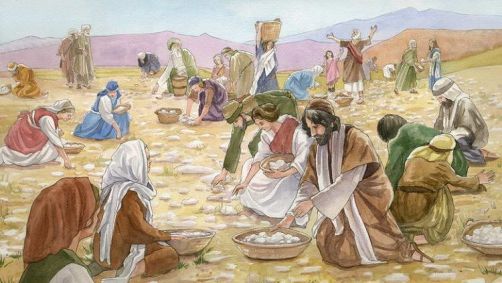Even people who haven’t heard of Choice Theory relate to the Caring and Deadly Habits when first introduced to them. Through the nodding of their heads and the chuckling sounds they make you can quickly see that they “get,” on a personal level, what it means to criticize and blame and threaten and punish and to anger, in general. And as people identify how deadly their behavior has been to the important relationships in their lives, they also become inspired to know more about the Caring Habits and how these kinds of habits can show up in their interactions with others.
I recently had a possible epiphany when considering a passage of the Bible through a Choice Theory lens. I say possible, because maybe what I am thinking is controversial. It doesn’t seem controversial to me, but I am interested in your reaction on this point.
It started when I read the April 18 passage in Jesus Calling, the devotional book by Sarah Young. The emphasis is on the gift of peace that God gives to us for each day, no more and no less. Since she is basing the emphasis on the instruction the people received about the collecting of manna, she writes that “Just as the Israelites could not store manna for the future but had to gather it daily, so it is with My [God’s] peace.”

This brought me back to the passage from Exodus 16:15-20 that reads –
Moses said to them, It is the bread the Lord has given you to eat. This is what the Lord has commanded: Each one is to gather as much as he needs. Take an omer for each person you have in your tent.”
The Israelites did as they were told; some gathered much, some little . . . Each one gathered as much as he needed.
Then Moses said to them, “No one is to keep any of it until morning.”
However, some of them paid no attention to Moses; they kept part of it until morning, but it was full of maggots and began to smell. So Moses was angry with them.
It is that phrase, “So Moses was angry with them,” that got my Choice Theory attention. This is what some would call a natural, and maybe even appropriate reaction. But did Moses need to be angry here? It seems to me that a matter-of-fact response would have been more helpful, to both the people and to Moses himself.
Spoiling of the manna as punishment vs. natural consequences.
Instead of anger, his response could have been marked by –
- You were told to take what you need for each day and don’t try to store it.
- So this is what happens when you store it.
- Reminder: Don’t store it.
- There is a lesson here about hearing and trusting God.
This got me to thinking and wondering if Moses’s tendency toward anger (this same anger led him to kill the Egyptian earlier in his life) bled into his interpretation and writing about God. Moses himself got angry in certain situations and he pictured God being angry, too. I don’t say this about Moses’s tendency toward anger as a criticism. I still respect him deeply and hold him in very high esteem. Remember that while he had the ability to get angry he was also described as the “meekest man on earth.”
What the passage does alert me to is the possibility that God may be different from how the Bible writers were able to capture and to represent Him. Am I off here? I can see danger in edging toward a view like the one I have just described, yet I keep coming back to Jesus – the beliefs He taught and the way of life He modeled – and Him saying clearly that if you have seen Me, you have seen the Father. There is no difference between them. NONE! And so, while the Bible writers of old could not do this, we now have the advantage of seeing God through the lens of Jesus. There doesn’t seem to be much danger in that.
===========================
Does the Bible misrepresent God, and if so, how often does this kind of thing occur?
What do we do, for instance, when in 1 Sam. 19:9 it refers to the “tormenting (evil) spirit of the Lord coming upon” Saul? And yet, in 2 Timothy 1:7 we are assured that “God has not given us a spirit of fear and timidity, but of power, love, and self-discipline.”
For me, such discrepancies, rather than causing doubt or discouragement, invite me to become a Biblical detective on the hunt for clues of understanding. Such a view does create a shift in how I see the role of inspiration, but it does not weaken my faith in Jesus or my drive to seek His character.
For everyone who asks, receives.
Everyone who seeks, finds.
And to everyone who knocks, the door will be opened.
Matt. 7:8